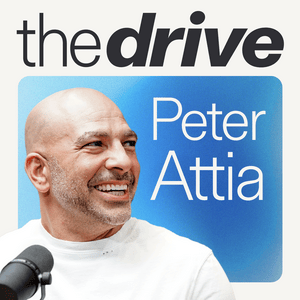#369 ‒ Rethinking protein needs for performance, muscle preservation, and longevity, and the mental and physical benefits of creatine supplementation and sauna use | Rhonda Patrick, Ph.D.
View the Show Notes Page for This Episode Become a Member to Receive Exclusive Content Sign Up to Receive Peter’s Weekly Newsletter Rhonda Patrick is a scientist, health educator, and host of the FoundMyFitness podcast whose work explores the intersection of nutrition, aging, and disease prevention. In this episode, Rhonda joins Peter for part two of his deep dive on protein, continuing last week’s discussion with David Allison and expanding the conversation to include creatine supplementation and sauna use. She discusses why the current RDA for protein is insufficient, how much more is needed to maintain muscle mass and prevent frailty, how activity level and aging influence protein requirements through mechanisms such as anabolic resistance, and how to determine optimal protein intake. The conversation also covers creatine’s proven effects on strength, endurance, and performance; its overlooked benefits for cognition and brain health; and the optimal dosing for different populations. Rhonda closes with the science behind sauna use, including its cardiovascular and cognitive benefits, the role of heat shock proteins, and practical guidance on temperature and duration. We discuss: Why the current protein RDA is too low, and why maintaining sufficient amino acid intake is vital for muscle preservation and health [3:30]; The case for raising the protein RDA by at least 50% [9:45]; Anabolic resistance: why inactivity—more than aging—blunts the body’s response to protein, and how resistance training restores it [14:00]; How sarcopenia develops, the profound effect of frailty on quality of life, and why it’s crucial to build and maintain muscle early [20:00]; Finding the optimal protein dose [25:00]; Why aiming higher is smarter: the case for targeting 2g of protein per kg of body weight in the real world [32:15]; Protein needs for pregnant women and growing adolescents [37:30]; Why higher protein intake is crucial when trying to lose fat while preserving or gaining muscle [39:45]; GLP-1 drugs: protein needs, muscle preservation, dosing strategies, evidence of broader health impacts, and more [43:45]; How overweight individuals should calculate protein needs based on target body weight [50:45]; Unpacking a misunderstood topic: the relationship between protein intake, mTOR activation, and longevity [52:00]; Why it’s unclear whether rapamycin is geroprotective in humans, and how misinterpreted animal data have fueled misconceptions about protein or mTOR activation being harmful [1:00:45]; The unmatched longevity benefits of exercise, its synergy with higher protein intake, and Peter’s recommended protein intake [1:06:15]; How Rhonda became fascinated with creatine—a well-studied, safe, and effective supplement for improving exercise performance [1:09:00]; Creatine for the brain: how higher doses may enhance cognition under stress and support resilience against aging and disease [1:16:30]; Optimal creatine use: dosing for adults and teens, safe product selection, debunking kidney myths, and more [1:25:45]; Sauna: how deliberate heat exposure mimics exercise, boosts cardiovascular and brain health, and shows promise for improving mood and mental resilience [1:32:15]; The benefits of sauna for reducing risk of dementia, and why hotter may not be better [1:41:15]; The FoundMyFitness podcast [1:45:30]; and More. Connect With Peter on Twitter, Instagram, Facebook and YouTube


